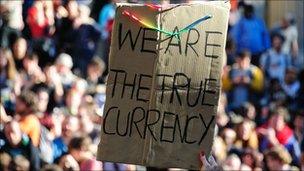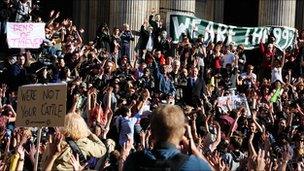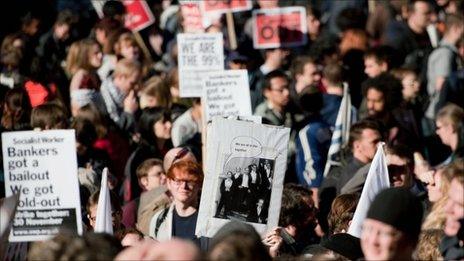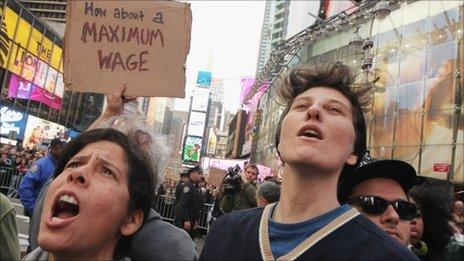'Occupy' is a response to economic permafrost
- Published

'Anonymous' people have become the new pole of attraction for the deep 'autonomist' movement.
In February I wrote a blog called "Twenty Reasons Why It's Kicking Off Everywhere". With the global Occupy protests yesterday it is still looking quite accurate. But it's now clear there is a 21st reason. And a 22nd. We've had nine months of political paralysis. And people have begun to feel the economic permafrost setting in.
I went down to Paternoster Square to observe the first few hours of the London protest. The police sealed off the square, which is private property, so the protesters squatted the steps of St Paul's Cathedral. They had a big, sit-down general assembly and then broke into small circles, cross-legged, then got back together and decided to stay the night. At that point there were around 2,000 people.
Who were they? This is not yet as demographically wide as the indignado camps in Madrid or Syntagma were when they first started. Nor is it as "mainstream" as Occupy Wall street - yet. Not a single mainstream British politician attempted to appear at the protest; not a single MP, not a single famous author or film-maker. Helen John, the Greenham Common veteran, spoke, as did Peter Tatchell, but the biggest response - indeed it was a rock-star like response - was for Julian Assange. He was acclaimed by 9/10ths of the crowd and barracked in ribald language by the others.
Of the people I met: lots of student occupation activists from last winter; veteran leftists and veteran anarchists going back to the days of Saltley Gate; people involved in NGOs; an Oxbridge professor of computer science; a large smattering of "Anonymous" people - with their Guy Fawkes masks - who've become the new pole of attraction for the deep "autonomist" movement. Some women with their babies. And - the biggest group - just ordinary people.
Though the place was swarming with media, including a hilarious spoof of a Fox News reporter wearing a flak jacket, the main complaint is that the media is ignoring them and does not understand them. This latter point I think is largely true.

Protesters mean to limit the power of finance capital and build a more equal society
Even in America, where the protests are bigger and have a bigger penumbra of liberal celebrities and writers to give them salience, the initial response to Occupy Wall Street was to ask: what does this mean for the Democrats? Will Obama's ratings improve?
It's a pointless question. Most people involved in such protests have switched off from mainstream politics: they believe it's a rich-person's club and totally impenetrable to reason or pressure. In Britain they have no intention of "raising demands" on Labour in opposition.
In fact they revel in their diversity; it was true in Syntagma and it is true at St Paul's - if you ask 50 people why they're here and what they want you will get 50 answers.
Powerful signal worldwide
But these protests are a powerful signal worldwide. Their mere existence shows that people are determined to "think globally" about routes out of this crisis - at a time when economics is driving politicians down the route of national solutions. However marginalised they are politically - and in some countries, above all America and Greece, they have broken out of marginalisation - it is still a fact: in 1931, as the remnants of Globalisation 1.0 collapsed, there were no mass international protests against austerity. There were plenty of national, and indeed nationalist ones.
The protesters yesterday stuck a spoof street sign saying "Tahrir Square, London, EC4M". This was not Tahrir - but it obeyed the same impulse to occupy physical space.

Protesters say the media is ignoring them
The impulse, I believe, is being driven by two things: first it is - as I wrote in the 20 reasons - a meme. It is an effective action that is transmitting itself independent of any democratic structures and party political hierarchies: if you camp somewhere, the press turn up and you can get an instant hit of wellbeing by, however briefly and tenuously, living the dream of a communal, negotiated existence.
Second, because this communal, negotiated, networked life already exists in people's heads as a result of the rapid adoption of social networks and networked lifestyles. As Manuel Castells, one of the first sociologists of the internet, said: the more autonomous and rebellious a person's attitudes are, the more they use the internet; the more they use the internet, the more autonomous their lifestyle becomes.
Something has been going on between the left earphone and the right earphone of this generation that represents a profound change in attitude. I am still struggling to get my own head around it (I'm trying to write a book about it but the events keep happening too fast).
What is absolutely clear however, is what they are determined to do: it's much bigger than any single-issue campaign or cause. They mean to limit the power of finance capital and build a more equal society, while rejecting the hierarchical methods of the parties that once claimed to do so. In this sense the movement is a kind of replacement social democracy; a mirror image of the besuited young people who populate the think tanks of Labour, the SPD, the US Democrats etc.
Occupy Everywhere, then, is the kind of movement you get when people start to believe mainstream politicians have lost their principles, or are trapped by vested interests, or are all crooked.
That's the answer to the question "what". The answer to why now? Basically we are in danger of a global stagnation - it was HSBC's economics team that described it as a permafrost. It poses the question "who pays for the banking crisis" very acutely. And large numbers of people are now realising it is going to be them, and more painfully, their children. As in Greece, in that circumstance, for every protester camped in the freezing dawn there may be many more quietly fuming in their living rooms who feel the same way.
- Published16 October 2011

- Published16 October 2011

- Published15 October 2011